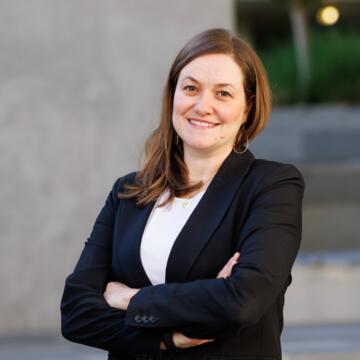
Lindsay M. Harris
Professor, Director, International Human Rights Clinic, Academic Director, International Programs, and Dean's Circle Scholar
Biography
Lindsay M. Harris is a professor of law and director of the Frank C. Newman International Human Rights Clinic. Before joining USF Law, Professor Harris served as Associate Dean of Clinical and Experiential Programs at the University of the District of Columbia David A. Clarke School of Law where she directed the Immigration and Human Rights Clinic. Professor Harris was the recipient of the AILA 2020 Elmer Fried Excellence in Teaching Award. Professor Harris has visited as Acting Director of the International Human Rights Law Clinic at American University and previously taught at Georgetown Law and George Mason.
Previously, Professor Harris worked at the American Immigration Council focused on efforts to end family detention and at the Tahirih Justice Center leading the African Women’s Empowerment Project. She clerked on the Ninth Circuit for the Honorable Harry Pregerson.
She thinks and writes in the asylum law space, but also explores clinical pedagogy and has a particular focus on secondary trauma and burnout among law students and lawyers. Professor Harris has published widely in law reviews but has also authored Op Eds published with the Washington Post, USA Today, Bloomberg, The Hill, and Ms. Magazine, among other outlets. Professor Harris co-edited a book titled How to Account for Trauma and Emotions in Law Teaching and is a co-author of the sixth edition of Carolina Academic Press casebook, Refugee Law and Policy: A Comparative Approach. Her forthcoming work with Laila L. Hlass focuses on the “parenting professor penalty” and is an examination of parenting in legal academia.
Expertise
- Asylum law & policy
- Immigration law
- International human rights
- Trauma and burnout
Research Areas
- Clinical pedagogy
- Trauma and burnout
- Immigration law - Asylum
- International human rights
Appointments
- Dean's Circle Scholar (2025-Present)
- Founding Board Member, AsylumWorks (2016-2021)
- American Immigration Lawyers Association, Member, Afghan Task Force (2021-2023)
- American Immigration Lawyers Association, Asylum Committee (2014-2022)
- Clinical Legal Education Association, Board member (2017-2020)
Education
- Georgetown Law, LLM in Advocacy, 2015
- University of California Berkeley Law, JD, 2009
- University of California San Diego, BA in International Studies, BA in Psychology, 2005
Prior Experience
-
Associate Dean of Clinical and Experiential Programs, University of the District of Columbia School of Law
-
Professor of Law, University of the District of Columbia School of Law
-
Fellow, American Immigration Council
-
Supervising Attorney and Clinical Teaching Fellow, Center for Applied Legal Studies, Georgetown University Law Center
-
Staff Attorney and Equal Justice Works Fellow, Tahirih Justice Center
-
Law Clerk, Hon. Harry Pregerson, Ninth Circuit Court of Appeals
Awards & Distinctions
-
University of San Francisco Provost's Award for Innovation in Global Education, 2024
-
Drexel University Thomas R. Kline School of Law Participatory Law Fund Award (with Yalda Royan), 2024
-
American Immigration Lawyers Association Elmer Fried Excellence in Teaching, 2020
-
UDC Law Lamplighter Award, 2018
-
Co-Director & Co-writer, The Learning Legal Interviewing and Language Access Film Project, 2018
Selected Publications
-
Lindsay M. Harris, Karen Musalo, Jennifer Moore, and Richard Boswell, Refugee Law and Policy: A Comparative and International Approach (2025). Carolina Academic Press (6th ed)
-
Lindsay M. Harris & Yalda Royan, Afghan Allies in Limbo: Discrimination in the U.S. Immigration Response, 61 San Diego L. Rev. 863 (2024).
-
Mallika Kaur & Lindsay M. Harris, How to Account for Trauma and Emotions in Law Teaching (2024) (co-edited).
-
Harris LM. Commentary on Reno v. Flores, 507 U.S. 292 (1993). In: Kim K, Lapp K, Lee J, eds. Feminist Judgments: Immigration Law Opinions Rewritten. Feminist Judgment Series: Rewritten Judicial Opinions. Cambridge: Cambridge University Press; 2023:173-196.
- Asylum Attorney Burnout and Secondary Traumatic Stress, 56 Wake Forest L. Rev. 733 (2021) (with Hillary Mellinger).
- Critical Interviewing, 21 Utah L. Rev 683 (2021) (with Laila L. Hlass).
- Asylum Under Attack: Restoring Asylum Protection in the United States, 67 Loyola L. Rev. 1 (2021).
- Withholding Protection, 50.3 Colum. Hum. Rts. L. Rev. 1 (2019).
- Learning in Baby Jail: Lessons from Law Student Engagement in Family Detention Centers, 25 Clinical Law Review 155 (2018).